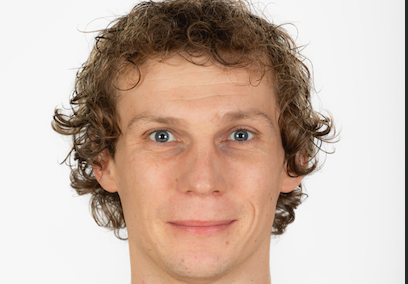Łukasz Ożga: Don Juan, adidasy i baletki
Łukasz Ożga: Don Juan, sneakers and ballet shoes
How did you get from Upper Silesia to Lower Silesia to the Wrocław Opera House?
I was looking for a place to spend the rest of my life. I have family close by. Wrocław was close to my heart. I had proposals from various theatres, but I came to the Wrocław Opera 15 years ago for an audition and that’s how it stayed.
Dancers are a bit of travelers. A ballet career is quite short, so they want to find an institution where they can fulfil themselves professionally. I was looking for a place where I could settle down and just start living life to the full. I really liked Wrocław and our opera house, so the decision was made quite quickly. I have found my place here, it is a part of me.
How did dancing shape you?
Ballet is almost everything to me. I give it a big part of myself and at the same time I try to successfully reconcile it with my private life. Many dancers live only for dancing, it is their whole world. Mine is also home, family and hobbies, for which I try to find time, although I must admit that I don’t have much of it, because I’ve been a father for two years. I really like practising sports: beach volleyball, table tennis, badminton, I have also done some squash and swimming. My passion is also travelling. I like to go out of town or further to get to know new people, customs and cuisine…
Your favourite travel destination?
There is a place in Greece where I return to every year….
A legendary place for artists…Hydra Island?
Yes, I feel great there, I’ve been there six times – I’ve walked the length and breadth of the island and I’ve got to know the local people and the cuisine.
Leonard Cohen wrote a lot of his lyrics there…
That’s right, and the Greeks remember it. I even saw a performance there, a very classic one, because it was in an open-air theatre, telling the story of Cohen’s life on the island. It really is a beautiful place.
Ballet is a big part of your life – how much did you have to sacrifice to become a dancer? You certainly had to sacrifice time…
When I was still at school I tried to separate the two worlds in which I was moving – my home with my childhood friends and the ballet school and the people there. It was not easy, and the biggest sacrifice was my free time. There were times when I didn’t go skiing with my friends because I was afraid I would twist my leg, and there was an important performance before me. Theatre is always somewhere in the back of my mind, so everyday requires me to organize my time.
How did your classmates react to the fact that you danced in ballet?
It varied. For many colleagues it was something funny, a subject for jokes. For others, it was something original, unknown, which made me get special treatment as someone who was doing something extra. Apart from that, I was a normal boy. When I needed to, I put on my sneakers and played football with my friends, and then I switched to ballet shoes and danced on stage in leotards. This was my asset and I used it. I answered questions and explained that ballet isn‘t just girls in pink dresses, it’s serious and very demanding. I experienced this when I was at a boarding ballet school in Bytom – I was 10 years old, I missed my family and it was not an easy time. However, when I went on stage, I knew I had found my place.
In a moment we will see you on the stage at the Wrocław Opera House in Don Juan. The title character in pop cultural understanding is a successful seducer and a handsome narcissist, who should not be taken seriously, while in your version we will see him as a man affected by a personal drama. This role seems to be quite an artistic challenge.
Don Juan treats all the people around him objectively. It is sad. He is a great egotist and has everything at the snap of his finger, but he is not happy. Maybe that’s the point. In life, you have to strive for something, and Don Juan doesn’t have that real goal. He doesn’t want to get involved with anyone, he only looks at himself and he’s used to getting everything he wants. In the end he is left alone, all his relationships are temporary.
How will you show this loneliness with your dance?
I want to understand this character, I definitely need to activate a lot of empathy in myself. During rehearsals we work hard to take care of every detail of our characters.
Is it a very physically demanding role?
Don Juan is a complicated performance. Usually as a dancer I had one partner on stage, and here there will be three, plus duets with Zanni and the Devil. Dancing with each of them is a separate challenge, because each person feels differently, and you have to adapt to each one differently.
And what about establishing intimacy with the dancers who partner you on stage? Don Juan is a performance with an erotic tinge.
Giorgio Madia tries to support us so that each of us on stage is as authentic and precise as possible. I’m used to closeness on stage, so I don’t feel any internal limitations, especially since ballet aesthetics deals with closeness in an artistic way. There will be nothing here that makes me uncomfortable.
In your opinion, what are the three qualities of a good dancer?
Hard work, hard work, hard work…😊

